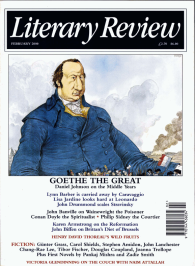Lynn Barber
Murky Tale of a Man who Lacked Decorum
M
By Peter Robb
Bloomsbury 563pp £25
M is a dazzling book which I imagine will spawn as many imitators as Longitude. It fits into no known genre: it is written with all the bravura of a novel but is not fiction; it is based on fact, but the facts are too sparse or too questionable to constitute a full biography. No matter. What M does is to introduce a completely new way of looking at paintings in their historical context. Normally historical context means some huge overview (‘the origins of the Renaissance’, ‘the death of Mannerism’), but M evokes the day-by-day context of a painter’s working career.
The painter is Caravaggio – Robb calls him ‘M’ because his real name was Michelangelo Merisi or Marisi. Caravaggio was the name of the small town east of Milan where his family lived. He was born in 1571 and died in 1610. These are almost the only certain facts known

Sign Up to our newsletter
Receive free articles, highlights from the archive, news, details of prizes, and much more.@Lit_Review
Follow Literary Review on Twitter
Twitter Feed
It wasn’t until 1825 that Pepys’s diary became available for the first time. How it was eventually decrypted and published is a story of subterfuge and duplicity.
Kate Loveman tells the tale.
Kate Loveman - Publishing Pepys
Kate Loveman: Publishing Pepys
literaryreview.co.uk
Arthur Christopher Benson was a pillar of the Edwardian establishment. He was supremely well connected. As his newly published diaries reveal, he was also riotously indiscreet.
Piers Brendon compares Benson’s journals to others from the 20th century.
Piers Brendon - Land of Dopes & Tories
Piers Brendon: Land of Dopes & Tories - The Benson Diaries: Selections from the Diary of Arthur Christopher Benson by Eamon Duffy & Ronald Hyam (edd)
literaryreview.co.uk
Of the siblings Gwen and Augustus John, it is Augustus who has commanded most attention from collectors and connoisseurs.
Was he really the finer artist, asks Tanya Harrod, or is it time Gwen emerged from her brother’s shadow?
Tanya Harrod - Cut from the Same Canvas
Tanya Harrod: Cut from the Same Canvas - Artists, Siblings, Visionaries: The Lives and Loves of Gwen and Augustus John by Judith Mackrell
literaryreview.co.uk